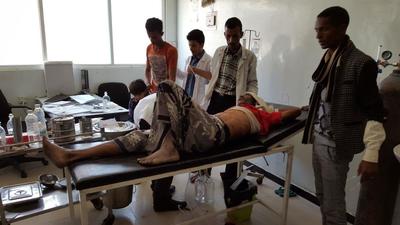Thousands of refugees who have fled violence in Central African Republic (CAR) are now struggling to survive in desperate conditions in Equateur province, northern Democratic Republic of Congo (DRC).
Since December 2014, an estimated 20,000 Central Africans have fled over the River Ubangi to into the Bili and Bosobolo health zones in Equateur Province, northern DRC, adding to 10,000 refugees already present in the area.
The refugees have arrived with very few possessions, if any, and are heavily dependent on the local community. Available supplies of food and drinking water must be divided among an increasingly large population and the threat of malnutrition and water-borne illness looms.
The MSF Emergency Pool in DRC is providing emergency medical aid to refugee and host communities alike in three health centres and the general reference hospital in the area.
Severe malnutrition
“Food is scarce and the markets are empty. We’re seeing rates of severe malnutrition above the emergency threshold, which is of serious concern. In the first week of MSF activities in this area, we have already hospitalised 10 children for severe malnutrition,” says Nathalie Gielen, Field Coordinator for the MSF Emergency Pool.
Refugees report having suffered violent attacks, kidnapping, rape, robbery and threats from armed groups on the CAR side of the border. Yet some people are so desperate for something to eat that they are choosing to go back to CAR in search of food.
“Life is hard here. We don’t have our fields or any money to buy things. Back home in CAR I had what I needed to work in the fields. But here, I have nothing,” says Anne Kabo, 73, a CAR refugee living in DRC with her family since last May.
“Sometimes I work for the locals in exchange for sorghum leaves to feed the family. We eat whatever we can every day or two. It’s mostly sorghum leaves, with no oil.”
Article continues below photostory
In pictures
In mid-February 2015, Médecins Sans Frontières/Doctors Without Borders (MSF) launched an intervention to provide free healthcare to 30,000 refugees and the Congolese communities hosting them.
Thanks to the hard work of daily workers and the community, our team was able to start an emergency intervention in a matter of days in Bili, Equateur province.
Women provide bundles of palm leaves for the construction of the MSF base in Bili.
Medical referent Jean Liyolongo explains the principles of MSF – neutrality, impartiality, independence – to Ministry of Health staff at the Bili reference hospital.
Wherever we work, we make sure that local people understand that MSF is politically neutral and will provide assistance to anyone who needs it. Gaining acceptance is key to our being able to work in difficult environments, like the DRC.
Refugees from CAR have been crossing the Ubangi river into DRC in pirogues much like this one.
Huts made of palm fronds, in a makeshift camp near Sidi, can be seen in the distance.
Josephine Mawutu fled the CAR following a violent attack on her village, Mbele 3. She lost multiple family members, including two of her four children, in the violence.
MSF motorcyclists make minor repairs to a bike as our teams make their way to health centres in three villages - Sidi, Dula and Nbangi – along the Ubangi river.
The teams travel by motorcycle due to the poor state of the roads in this part of the country.
Ilène recovers from surgery in the Bili reference hospital. Before MSF began offering free inpatient care here, the hospital charged US$20 for a surgical intervention – far more than many people can afford in Congo, where most people live on less than $2 per day.
Inevitable spread of disease
Sanitation and drinkable water are also major problems in the area. There is no source of potable water and sanitation – especially in the makeshift sites where refugees live – is very poor. Many people take their drinking water directly from the river, which could cause water-borne diseases to spread.
“In such conditions, the spread of disease is more or less inevitable. Last week there was a suspected case of typhoid fever in one of the makeshift sites where the refugees live – a 12-year-old boy. The family buried the body right next to their hut,” says Nathalie.
There are currently plans to relocate the refugees to a camp near Bili, 60km south of the river, starting in late February. But moving thousands of refugees could take weeks, and in the meantime, refugees and host population alike are in dire need of humanitarian assistance.
Struggling for food and water
“Though many people have just arrived in this area, there are others who have been living in these conditions for months. Refugees and the host community are struggling to find adequate food and water, supplies of which were scarce to begin with,” says Nathalie.
“More humanitarian assistance – especially in terms of food and water and sanitation – is needed until a more durable solution is in place.”
The MSF Congo Emergency Pool is providing emergency medical aid in Sidi, Gbangi and Dula health centres along the Congolese side of the River Ubangi, in Equateur Province. MSF teams are also supporting the district hospital in Bili providing hospitalisation, mental health services and maternity services.
Since commencing activities on 6th February, the team has carried out 754 consultations and hospitalised 72 patients.





